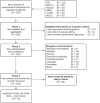Development and content validity of the cognition in daily life scale (CDL)
- PMID: 38656293
- PMCID: PMC11854039
- DOI: 10.1080/09602011.2024.2343149
Development and content validity of the cognition in daily life scale (CDL)
Abstract
Cognitive impairment can negatively influence daily functioning. Current cognitive measures are essential for diagnosing cognitive impairment, but findings on these tests do not always represent the level of cognitive functioning in daily life. Therefore, this study aimed to design a structured measurement instrument to observe and rate the impact of cognitive impairment in daily life, named the cognition in daily life scale for persons with cognitive problems (CDL). In this paper we describe the development, expected usability, and psychometric properties (content and face validity) of the instrument. The CDL was established through three consecutive development phases: (1) item selection, (2) item categorization and comparison, and (3) item revision and manual construction. Subsequently, a panel of eleven international experts rated the relevance of the selected items and provided comments on the expected usability and face validity. Content validity was estimated with the content validity index, based on which four items were removed. The experts' comments led to minor adjustments of the manual, domains, and formulation of the maintained items. The final instrument consists of 65 items describing behaviour that relies on cognitive functions within six domains. Future research should focus on evaluating the construct validity and reliability of the CDL.
Keywords: Cognitive functioning; Content validity; Ecological validity; Neuropsychological assessment; Observation.
Conflict of interest statement
No potential conflict of interest was reported by the author(s).
Figures
Similar articles
-
Validation of the Erlangen Test of Activities of Daily Living in Persons with Mild Dementia or Mild Cognitive Impairment (ETAM).BMC Geriatr. 2016 May 26;16:111. doi: 10.1186/s12877-016-0271-9. BMC Geriatr. 2016. PMID: 27229937 Free PMC article. Clinical Trial.
-
Development of the headache activities of daily living index: initial validity study.J Manipulative Physiol Ther. 2015 Feb;38(2):102-11. doi: 10.1016/j.jmpt.2014.12.002. Epub 2015 Jan 21. J Manipulative Physiol Ther. 2015. PMID: 25618575
-
Development of a patient-reported outcome measure for psychotherapeutic interventions in people with seizures: A mixed methods study.Epilepsy Behav. 2019 Oct;99:106464. doi: 10.1016/j.yebeh.2019.106464. Epub 2019 Aug 14. Epilepsy Behav. 2019. PMID: 31421518
-
Development of an instrument for measuring activities of daily living in persons with suspected cognitive impairment.Scand J Occup Ther. 2016;23(3):230-9. doi: 10.3109/11038128.2016.1139621. Epub 2016 Feb 8. Scand J Occup Ther. 2016. PMID: 26853384
-
Beyond cognitive dysfunction: Relevance of ecological validity of neuropsychological tests in multiple sclerosis.Mult Scler. 2019 Sep;25(10):1412-1419. doi: 10.1177/1352458519860318. Mult Scler. 2019. PMID: 31469351 Review.
References
-
- Árnadóttir, G. (1992). The Árnadóttir OT-ADL neurobehavioral evaluation (A-ONE): concurrent validity. In IVth European congress of ergotherapy, ostend, Belgium.
-
- Bootes, K., & Chapparo, C. J. (2002). Cognitive and behavioural assessment of people with traumatic brain injury in the work place: Occupational therapists’ perceptions. Work, 19(3), 255–268. - PubMed
Publication types
MeSH terms
LinkOut - more resources
Full Text Sources
Medical


